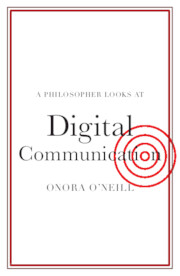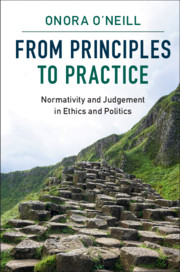A Philosopher Looks at Digital Communication
Communication is complicated, and so is the ethics of communication. We communicate about innumerable topics, to varied audiences, using a gamut of technologies. The ethics of communication, therefore, has to address a wide range of technical, ethical and epistemic requirements. In this book, Onora O'Neill shows how digital technologies have made communication more demanding: they can support communication with huge numbers of distant and dispersed recipients; they can amplify or suppress selected content; and they can target or ignore selected audiences. Often this is done anonymously, making it harder for readers and listeners, viewers and browsers, to assess which claims are true or false, reliable or misleading, flaky or fake. So how can we empower users to assess and evaluate digital communication, so that they can tell which standards it meets and which it flouts? That is the challenge which this book explores.
- Argues that the ethics of communication needs to focus on listeners, readers, browsers and audiences as well as originators
- Explores how past changes in communication technologies can shed light on the challenges that digital technologies have created for communication
- Locates the role of rights to communicate – especially freedom of expression and the right to privacy – in a wider context that sees communication as connecting originators to recipients
Reviews & endorsements
'This book tackles one of the most crucial ethical issues facing us in the age of online communication and digital information. It is clear, concise and yet deep and insightful.' Maria Baghramian, University College Dublin
'… this book is an important and original contribution to the ethics of digital communication. It is definitely worth reading, especially for those working on the ethics of technology and the digital public sphere.' Ugur Aytac, Metascience
Product details
February 2022Paperback
9781108986816
150 pages
197 × 130 × 14 mm
0.2kg
Available
Table of Contents
- Part I. Complex Communication:
- 1. Presuppositions of Communication
- 2. Acts and Content, Norms and Harms
- 3. Communication and New Technologies
- 4. Digital Hopes
- Part II. Norms and Standards in a Connected World:
- 5. Duties and Rights 1: Freedom of Expression
- 6. Duties and Rights 2: Rights to Privacy
- Part III. Politics and Connectivity:
- 7. Power and Anonymity.






